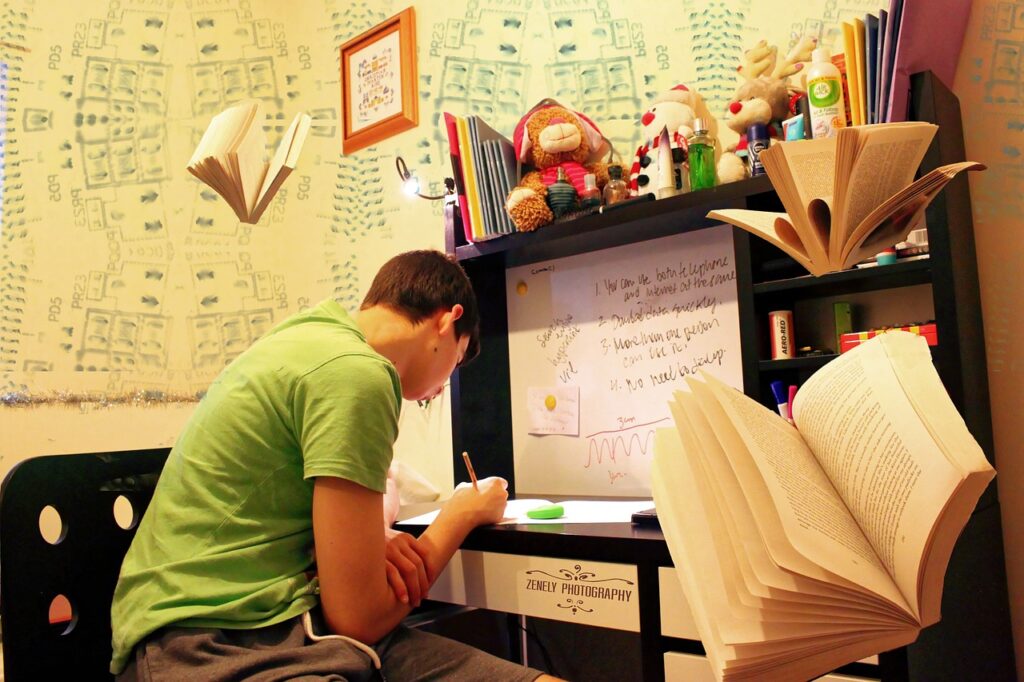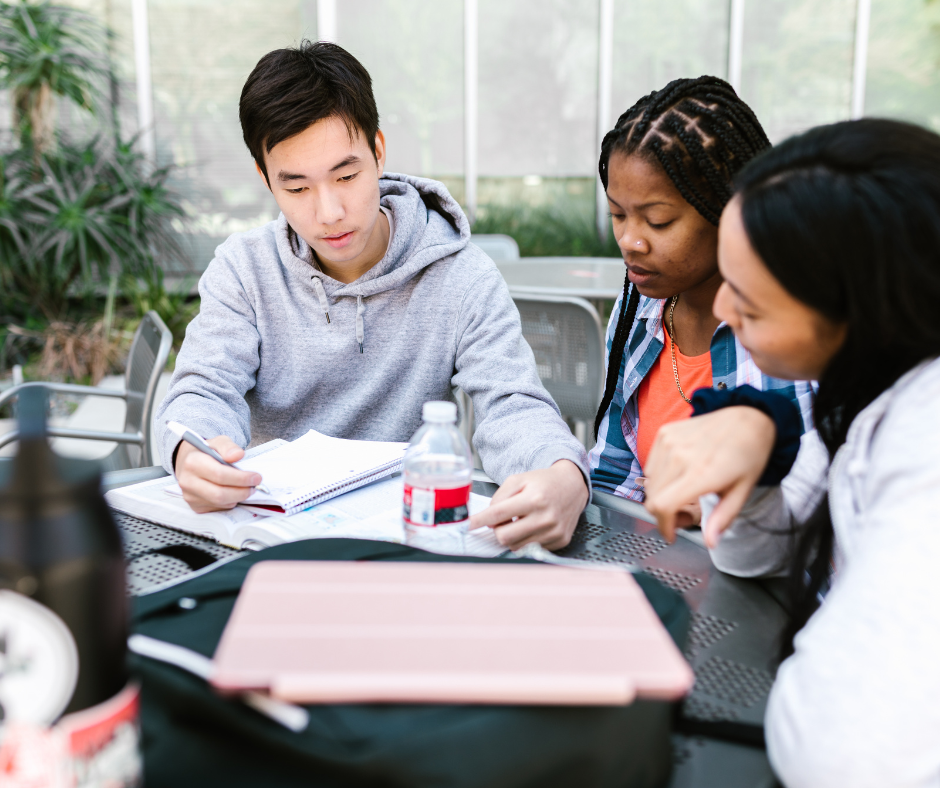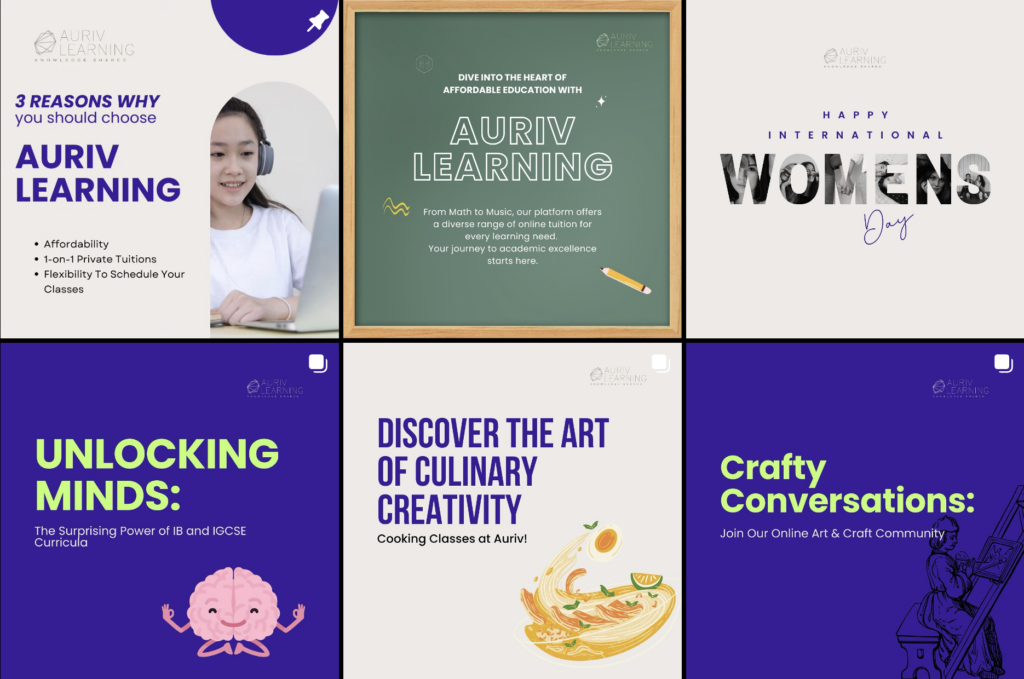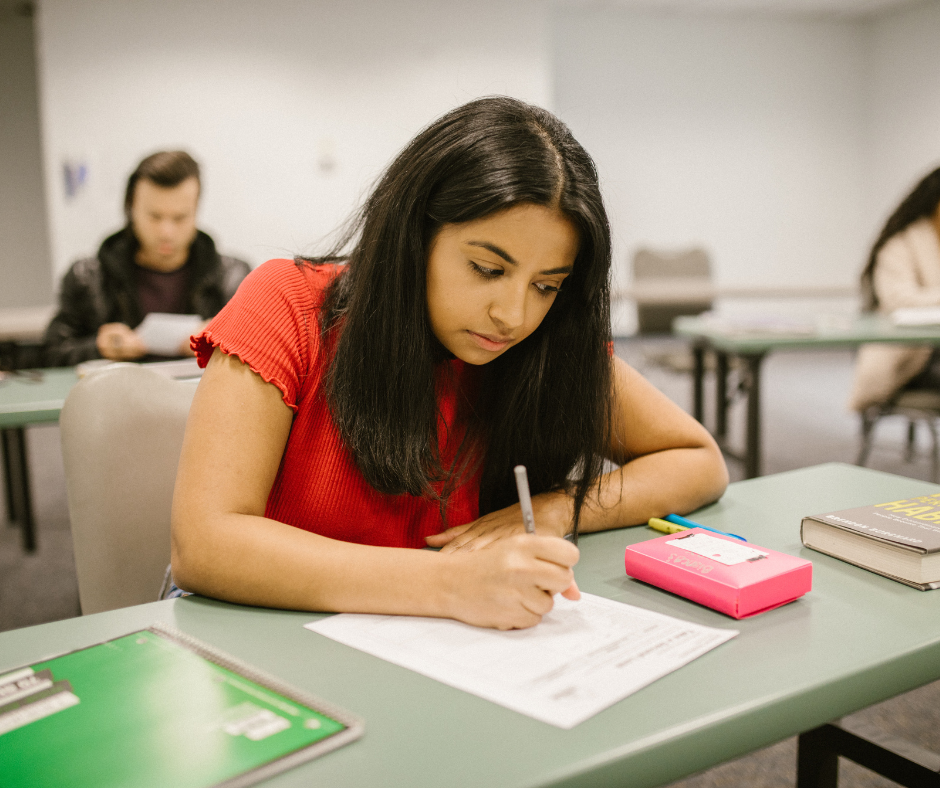Are you feeling the weight of upcoming exams? It’s an everyday struggle, but you can overcome it with a handful of proven study techniques. These techniques can revolutionize your learning journey and elevate your exam performance.
This article will equip you with top study tips to help you feel confident on exam day.
Yes, it is true! Studying can be tiresome. But the good news is with effective study habits, you can make the process more efficient, enjoyable, and, most importantly, impactful.
So, take a deep breath, grab your book, and get ready to crush those exams!
How can I focus 100% on Studying?
Have you ever heard the saying “practice makes perfect”? It’s a timeless truth that applies to almost everything in life.
Whether you wish to learn a new language, master a musical instrument, or aim to ace that upcoming exam, consistent practice is the key to success.
Practice isn’t just about mindless repetition. It’s about pushing yourself outside your comfort zone, learning from mistakes, and steadily improving.
To focus 100% on studying:
- Create a distraction-free environment by finding a quiet spot and keeping your phone out of reach.
- Imagine this: you sit at your favorite coffee shop with your laptop, but instead of mindlessly scrolling through social media, you use the Pomodoro method—25 minutes of focused study followed by a 5-minute break.
- Set clear, specific goals for each session, like mastering a chapter or completing a set of problems.
- Prioritize your tasks, tackle the most challenging first, and avoid multitasking.
- Keep your study area organized, and ensure you’re well-rested, fed, and hydrated.
- Engage with the material actively—try teaching a concept to a friend or summarizing it in your own words.
- Practice mindfulness to calm your mind, and adjust your strategies to see what works best for you.
Transforming your study sessions this way will help you make the most of your time and maintain a high concentration level.
Are you looking to learn a new language? Then, please do read our blog “How to learn Spanish?”
What is the Best Trick to Study?
There isn’t one “best trick” to studying that works for everyone, as different students learn and retain information in various ways. However, you can combine different techniques to create a personalized study approach to ace your exams:
Start by breaking the material into smaller parts and concentrate on the most important ideas or topics that will likely come up in the exams or your papers.
Next, make a detailed study schedule that sets specific times for reviewing different subjects or chapters.
Cramming the night before is a recipe for disaster. Instead, space out your studying over time using techniques like flashcards or spaced repetition apps. This reinforces information retrieval and improves long-term retention.
Moreover, practice makes perfect, and here are some reasons why!
Builds Memory
The more you practice something, the more ingrained it becomes in your brain and body. Muscle memory takes over, allowing you to perform tasks smoothly and efficiently.
Improves Confidence
As your skills improve, so does your confidence. You’ll start to tackle challenges with a “can-do” attitude and a belief in your abilities.
Work on Weak Spots
Practice isn’t just about perfecting your strengths. It also helps you identify areas for improvement. By actively practicing, you’ll uncover your weak spots so you can focus on refining them.
Experiment to discover what environment works best for you. Some students thrive in quiet libraries, while others prefer group study sessions or background noise. The “best trick” is the one that works best for you. Create a study routine that keeps you engaged and motivated, ultimately leading to exam success!
How to Study Smartly? 10 Study Techniques
Ever feel like your studying efforts aren’t quite hitting the mark? There are plenty of simple and effective study strategies that can help you succeed in examinations.
Whether it’s participating actively in class, managing your time wisely, or making the most of campus resources, here are 10 study techniques to help you study smarter, not harder:
1. Don’t Just Read your Textbook like a Novel
When studying, it’s important to remember that you need to do more than just read your textbook from start to finish to help you remember the information well. It’s like reading a story instead of studying. Think of reading as the first step, not the only one, in learning. Active studying means doing more than just reading. It means getting involved with the material differently to understand it.
Instead of just reading, make a study guide with questions and answers, or pretend you’re the teacher and explain the ideas aloud. Develop examples that make sense to you or draw diagrams to help you understand. For technical subjects, solve problems and explain how you did it. For other subjects, focus on understanding the main ideas.
Being organized is also essential. When studying, gather all your materials for one topic and study them together. It helps you stay focused and understand the material better. Remember, learning is actively engaging with the information, not just passively reading it.

2. Cut Off Everything that Steals Your Time:
Ever feel like you’re surrounded by tiny attention gremlins when you try to study? You open your textbook, ready to dive in, but then… your phone buzzes. You check it – it’s just a funny cat video your friend sent. “No big deal,” you think, but a few minutes later, you find yourself scrolling through a rabbit hole of cute animal videos. Next thing you know, an hour has vanished!
Dealing with distractions while studying can be challenging. It’s essential to address both physical and digital distractions to overcome these challenges.
Turn off Wi-Fi
If you don’t need the Internet for your studies, simply switch it off. This will help you avoid going online when you should be focusing on studying.
No Phones
Take control of your phone. Keep your phone out of sight and ensure your notifications are switched off. Utilize specialized apps to block distractions and set study timers for maximum focus.
Study with Friends
Remember to stay focused when studying with friends to avoid distractions. Working together can be beneficial, but agreeing on maintaining concentration and helping each other stay on track is essential. Eliminating distractions will improve your ability to concentrate and increase your productivity during study sessions.
3. Develop a “Distributed Study” Technique:
Make sure to spread your studying over shorter periods across multiple days instead of cramming it into long sessions. This method, known as “distributed practice,” is an effective way to learn.
Here’s how to do it:
Control Your Schedule
Make a list of what you need to study each day. Be realistic about your time and ability to accomplish this.
Short Study Sessions
Break up your study time into smaller chunks. For example, work on a few math problems or review your history notes for 15-20 minutes daily.
Avoid Procrastination
Spreading out your study sessions makes it easier to avoid procrastination. Instead of dreading a big study session, you only have to focus briefly each day.
Memorization Tips
If you need to memorize names or dates, use flashcards and review them daily. This will help you remember things better than memorizing everything all at once.
By studying a little bit daily, you’ll stay focused, remember more, and feel less stressed about exams and projects.

4. Schedule Enough Breaks In between Study Time
Taking regular breaks is essential to stay fresh and focused when studying. A 15 to 20-minute break can help improve productivity.
Here are some simple ideas for what you can do during your breaks:
- Listening to a favourite song can lift your mood.
- Spend time with a friend for a quick chat.
- Stretch your body to release tension.
- Try a short meditation to relax your mind.
- Take a moment to daydream and let your thoughts wander.
- Grab a healthy snack to refuel your energy.
- Enjoy a quick shower to refresh yourself.
- Tidy up your study space for a clearer mind.
But remember, during your breaks, opt for activities that help you relax and recharge without distracting you too much. Avoid things like checking your phone or scrolling through social media, as they can make concentrating harder when you return to studying.

5. Set Specific Study Goals for Each Session
Feeling overwhelmed by vague study plans? Here’s the secret weapon: specific study goals for each session! Forget about generalized goals like “study for history.” Instead, get laser-focused on what you want to achieve in each session.
There are two main ways to set specific goals:
Time-Based Goals
Example: “Focus on understanding the French Revolution for 45 minutes.” This ensures you dedicate a specific amount of time to a particular topic.
Content-Based Goals
Example: “Read and analyze Chapters 5 and 6 of my Psychology textbook.” This ensures you cover a specific amount of material within a session.
Having specific goals gives your study session a clear direction and purpose. You’ll know precisely what you must accomplish, keeping you focused and motivated. By targeting particular topics or timeframes, you’ll avoid aimlessly drifting through your study materials, leading to a more efficient use of your study time. Completing specific goals provides a sense of accomplishment, keeping you motivated and energized throughout your study session. Sometimes, you may not hit your exact goals. Don’t be discouraged! Just adjust your goals for the next session and keep moving forward. The important thing is to have a plan and actively work towards achieving your study objectives.
6. Work on Past Question Papers:
Many will want to ask, “Is past paper the best way to learn?” We must reiterate that one of the best ways to prepare is by practicing with old versions of previous exams. These past question papers are like a sneak peek into what you might encounter on the test. They help you understand the format of the questions and how they’re structured.
Practicing with past exams isn’t just about getting familiar with the content—it’s also about getting comfortable with the pace and timing of the test. Working through old exam papers allows you to analyze how long it takes to complete each section and manage your time more effectively during the exam.
Additionally, practicing with past exams allows you to identify areas needing more review or practice. You can focus your study areas to strengthen and improve your test performance.
7. Join a Study Group
Are you feeling overwhelmed by studying alone? Want to make learning more fun and effective? Then grab your classmates and form a study group!
Working with others in a study group allows you to tackle challenging problems together. You can share different approaches and help each other understand complex concepts.
Further study groups provide a supportive environment where members can encourage each other and hold one another accountable to their study goals.
Moreover, explaining concepts to others in the group can deepen one’s understanding and retention of the material. Teaching others reinforces one’s knowledge and helps grasp the subject matter.

8. Approaching a Tutor for Help
When you encounter challenges understanding a problem or concept in your textbook, reaching out for help can be incredibly beneficial. You can approach a teacher, friend, or a study group member. If you require more individualized support, consider engaging a tutor. Tutors are equipped to aid students with complex subjects and can offer personalized guidance tailored to your specific needs.
If you need a personal tutor, Auriv Learning is here to help. We make it easy to connect with experienced tutors who can provide one-on-one guidance in various subjects. Whether you’re struggling with math, science, language arts, or any other topic, our team of dedicated tutors is ready to support you on your learning journey. With Auriv Learning, you can find the perfect tutor to meet your needs and schedule, ensuring you receive the individualized support necessary to succeed.
9. Celebrate Your Wins: Pat Yourself on the Back
Studying can be challenging, so it’s vital to acknowledge your hard work! Tell yourself you’ll get a small reward if you reach your goal. It could be something simple like chocolate, a cup of coffee, or a quick game break. The reward should be something you genuinely enjoy. It could be a delicious snack, a quick game on your phone, or an episode of your favorite show. Completed a particularly challenging chapter or aced a practice exam? Celebrate with a bigger reward! This could be a nice meal or a relaxing activity with friends.
Doing small things for yourself will help you stay motivated and focused and achieve your academic goals. So plan some fun activities and prepare to pat yourself on the Back after a hard day’s work.

10. Sleep Like a Champ: Rest Well Before an Exam
Exams can be stressful, and that precious sleep can easily slip away. But here’s the truth: getting enough rest is critical for exam success. Think of your brain as a high-performance athlete. Just like an athlete needs rest to perform their best, your brain needs sleep to function at its peak. Adequate sleep enhances your concentration and focus. This allows you to process information clearly, recall facts more efficiently, and approach the exam with a sharp mind. Feeling nervous before an exam is normal. However, lack of sleep can make you anxious, making it harder to think clearly and perform your best. A good night’s sleep helps you stay calm and collected during the exam.
Takeaway
In conclusion, conquering exams isn’t just about memorizing facts. It’s about adopting effective study techniques that transform learning into active engagement and understanding. By incorporating these strategies – setting specific goals, utilizing past papers, forming a study group, harnessing the power of visuals, and rewarding yourself – you’ll retain information and approach exams with confidence and a thirst for knowledge. Successful studying isn’t about cramming the night before; it’s about creating a sustainable, well-rounded approach that empowers you to excel throughout your academic journey. So, whether mastering complex concepts or conquering challenging exams, implementing these strategies can pave the way for academic success and a brighter future.


 May 27, 2024
May 27, 2024  12 Min
12 Min  No Comment
No Comment 



